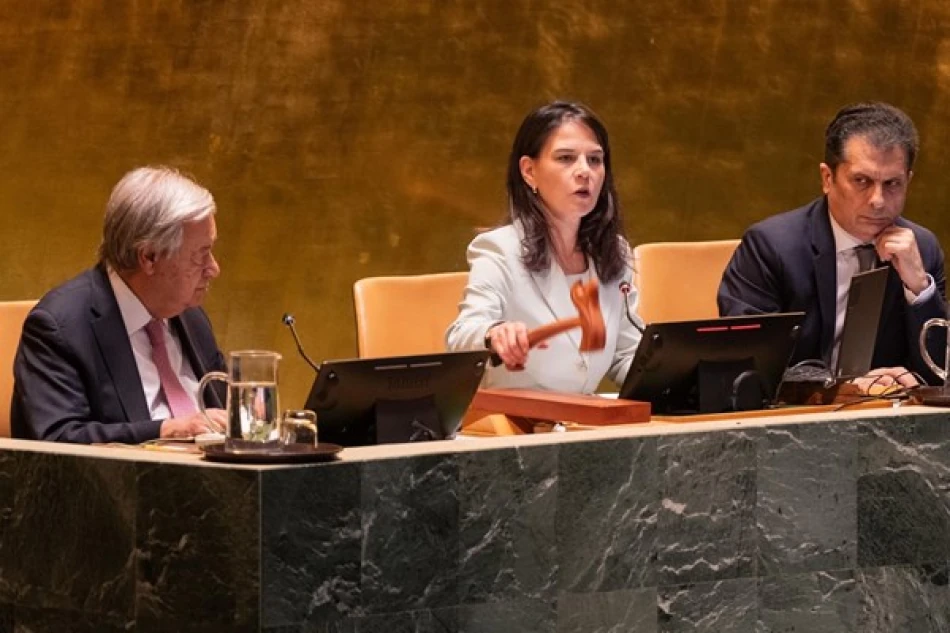
UN General Assembly Convenes 80th Session, Tackling Global Challenges
UN General Assembly Opens 80th Session with Stark Warning: Global Crises Demand Urgent Reform
The United Nations General Assembly launched its 80th session Tuesday evening in New York with an unusually blunt assessment of global failures, as new President Annalena Baerbock warned that the world body faces a critical juncture amid mounting financial and political pressures. Her opening address highlighted stark humanitarian crises—from starving children in Gaza to 808 million people trapped in extreme poverty—while calling for fundamental reforms to make the UN fit for the 21st century.
A Moment of Reckoning for Global Governance
Baerbock's inaugural speech to representatives from all 193 member states painted a sobering picture of global dysfunction. She questioned the UN's current effectiveness in fulfilling its founding mission to "save humanity from hell" while conflicts rage, the planet burns, and human rights violations persist worldwide.
The German Foreign Minister, who becomes only the fifth woman to lead the General Assembly in the UN's 80-year history, described this session as "extraordinary" given the crossroads facing international cooperation. Her remarks reflect growing frustration among member states about the UN's capacity to address 21st-century challenges with governance structures designed for the post-World War II era.
The UN's Paradox: Indispensable Yet Inadequate
Demonstrating Global Impact
Despite her criticism, Baerbock emphasized the UN's irreplaceable role as the only organization capable of uniting all nations with global political legitimacy and moral authority. She cited impressive statistics showcasing UN agency effectiveness: 26 million children receiving education through UNICEF, 125 million people accessing life-saving food aid via the World Food Programme, and nearly 5 billion air travelers reaching destinations safely due to International Civil Aviation Organization standards.
The Limits of National Solutions
Her argument that even the world's largest economies cannot tackle global challenges alone resonates particularly strongly as geopolitical tensions fragment international cooperation. This perspective challenges the growing trend toward unilateral action and economic nationalism that has characterized recent years, from trade wars to pandemic responses.
Reform Agenda: Beyond Rhetoric to Action
Baerbock outlined her presidency's focus on revitalizing and strengthening the organization to achieve its core objectives in peace, security, sustainable development, and human rights for the next 80 years. This reform push comes as the UN faces mounting criticism over Security Council paralysis, peacekeeping failures, and bureaucratic inefficiency.
Her agenda includes overseeing the selection of the next UN Secretary-General, a process that could significantly influence the organization's future direction. With Secretary-General António Guterres's term considerations looming, member states are increasingly focused on leadership that can navigate complex geopolitical realities.
Financial and Political Pressures Mount
The acknowledgment of financial and political pressures facing the UN reflects deeper structural problems. The organization continues struggling with chronic underfunding, with major powers often withholding contributions to express displeasure with UN positions. Simultaneously, emerging economies demand greater representation in decision-making bodies that still reflect 1945 power structures.
Baerbock's commitment to serve all 193 member states equally through neutrality and bridge-building represents an ambitious goal in an era of intensifying great power competition. Her approach will be tested immediately as the General Assembly addresses contentious issues from climate action to conflict resolution.
Looking Forward: The Next 80 Years
The transition from outgoing President Philemon Yang, whom Guterres praised for his wisdom and insight during a challenging year, symbolizes continuity amid change. However, Baerbock's frank assessment suggests incremental adjustments may no longer suffice.
The 80th session opens against a backdrop of multiple global crises that test multilateral institutions' relevance. Success will likely depend on whether member states can move beyond rhetorical commitments to concrete reforms that enhance the UN's capacity to address transnational challenges effectively. The stakes could not be higher for an organization that remains humanity's primary forum for collective action, despite its evident limitations.
Most Viewed News

 Layla Al Mansoori
Layla Al Mansoori






